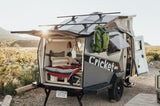Working while camping brings a whole new meaning to being in the weeds at work. With the proper habitat and equipment, you can have a comfortable and efficient office space nearly anywhere! Use our guide to choose your ideal campsite, find a workspace that suits your needs, and stay connected with the right technology.
Health benefits of working outdoors
When you work outside, you can enjoy physical and mental health benefits. The majority of Americans spend nearly 90% of their day indoors; and according to the Environmental Protection Agency, the air quality inside can sometimes have levels of pollutants higher than outside. A scholarly review also found that increased exposure to green spaces resulted in lowered stress levels, blood pressure, heart rate, and cholesterol. Furthermore, the U.S. Department of Agriculture states that being out in nature not only reduces depression but boosts mental capacity and attentiveness. Not to mention, being outdoors has been shown to increase feelings of empathy and general well-being.
Work-life balance
A home office engulfed by nature grants more opportunities to enjoy fulfilling coffee breaks. Morning walks or hiking can be the perfect way to energize your body and mind before settling into your daily tasks. Depending on the campground, you could find time to go swimming or canoeing on your lunch break. At the very least, you can step right into nature at the end of your day — effectively remodeling your work-life balance.
How to work at camp like a pro
You can enjoy the benefits of working in nature by visiting a green space — whether at a park, trail, or coffee shop with a garden. However, the adventurous remote worker gets as close to nature as possible by camping while working. The main things you need to have a successful campsite work experience are protection from the elements, a power source, Wi-Fi, basic amenities (like a washroom), and supplies for cooking. You’ll also want to research campsites and national parks for the best time of year to visit and a list of amenities.
Choosing a campsite office
Researching Wi-Fi connectivity, amenities offered, and the seasonality of potential campgrounds can help you find the ideal woodland office. For a reliable hotspot connection, check if your mobile service provider covers the intended campsite (most campsite websites will list this information). Even major cities around the U.S. have plenty of campgrounds to choose from within a short drive — so finding the ideal camping space for remote work shouldn’t be too time-consuming.
Creating a workspace
You can work out of a tent, cabin, or camper; in our experience, working out of a camper trailer is more comfortable than a tent and offers the most freedom of mobility. Rooftop tents are a respectable middle ground between the two options. You can enjoy all the comforts of a mobile home while still connecting with nature by installing a tent on top of your camper trailer.
After you choose your workspace, find a stable surface to use as a desk. Some mobile habitats, like the TAXA Mantis, even come with a convertible standing/sitting work desk — investing in this option isn’t a bad idea if you plan to work while camping frequently. You’ll also want to organize anything else you need, like stationary, in a cabinet or drawer nearby.
Staying charged
Most campsites in the United States have hookups for electrical power, but using multiple power sources can increase your freedom to choose exactly where you work. As long as you have access to camping internet or a hotspot, a calm and sunny spot at a campground could elevate your time on the job. Some pragmatic gadgets and convenient gizmos to keep you charged on your work camping trip are:
- Portable solar batteries – nearly essential for most camping trips, these are sometimes referred to as a solar power bank, and basic models cost under $30.
- Portable charger – useful for when you don’t have access to an electrical hookup or solar charger, or an overcast day reduces your solar power potential. Moreover, if the temperature drops, electronics won’t hold a charge as long — a portable charger can help extend your device’s battery life.
- Power stations – giant portable chargers with various outlets, RV ports, and solar panel hookups, a solar power station is a great backup power source for remote camping workers.
How to get Wi-Fi while camping
Decent camping internet can be tricky to secure (even if a campsite provides Wi-Fi) you may only get a strong reception in a few areas. Additionally, relying solely on a mobile hotspot when working outside can get pricey. To stay connected, try out some of these gadgets and services:
- Wi-Fi signal booster – even when you’re not working while camping, a Wi-Fi booster is a helpful commodity. A decent model costs $50 and helps deliver a steady connection to your devices and laptop.
- Unlimited data and roaming – upgrading your mobile connectivity might be a good option if you’re worried about getting Wi-Fi or just staying connected in general. Of course, finding mobile coverage can still be challenging, but less so than using campsite internet in some cases.
- Mobile satellite internet – although somewhat costly, an RV-mounted satellite can deliver reliable internet while on the job. These gadgets are low-profile, so you won’t have to add a honking dish atop a vehicle or camper.
Lunch breaks at your campsite office
When you’re spending time outdoors, preparing your meals at the campsite can be a great way to save time and money. Most RVs and trailer campers have a stove or other cooking facilities and ample space to prepare meals. Some mobile trailers like Cricket and Mantis come with indoor kitchens, while others, like TigetMoth and Woolly Bear, utilize an outdoor kitchen setup. Even if you want to avoid cooking at your campsite, many campgrounds offer on-site dining options, and you can always venture into town for your lunch break.
Bathroom breaks
You may have to leave your campsite to use the restroom; in these instances, having a safe place to stow your laptop and other valuable devices is helpful. Keeping your belongings safe if you need to use a campsite shower also grants peace of mind. You can also invest in an RV or camper trailer with a portable or built-in restroom for a more convenient experience.
Keeping your gear secure
Some occupations require top-end electronics, like computers and new phones — stow them safely while working at a campsite. Keeping them dry and away from the elements is one thing, but consider general security as well. While it’s unlikely that someone will decide to abscond with your work computer, it’s better to be safe than sorry. Locking up your electronics in a camper is a great way to immerse yourself in nature while keeping a carefree mindset.
Work remotely from a mobile habitat
Camper trailers can give you the best of both worlds — a successful workday and a rejuvenating nature experience. At TAXA, our mobile campers use NASA-inspired design and functionality for adventurers from all walks of life. Our most spacious camper, Mantis is a garageable, versatile camper trailer with everything you need to start creating your outdoor office space. Contact our sales team to learn more about working out of a camper today!


